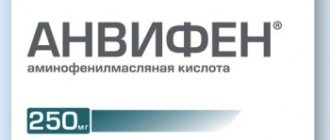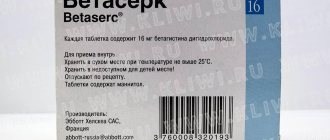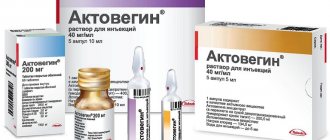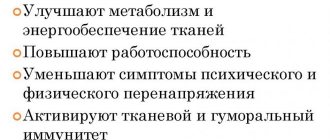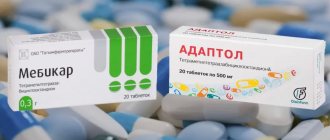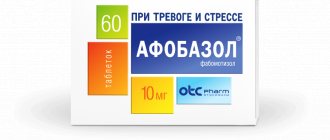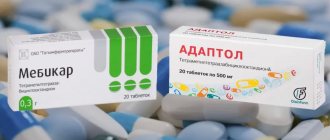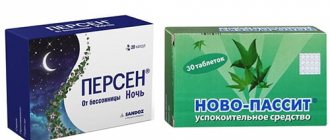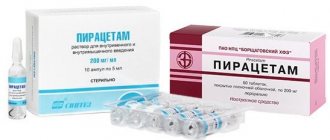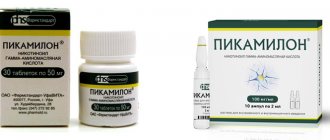Update date: 07/09/2020 17:06:24 12305 Share:
Author: Maria Feldshtein
*Review of the best according to the editors of simplerule.ru. About the selection criteria. This material is subjective in nature, does not constitute advertising and does not serve as a purchase guide. Before purchasing, consultation with a specialist is required.
Phenibut and Adaptol are used in clinical practice for the treatment of neuroses and neurosis-like conditions, including those caused by stress. To an uninitiated person, the drugs may seem the same - both are prescribed as a sedative. In fact, the difference between them is significant, because the drugs differ in composition and scope of application. We compared them: we looked at their strengths and weaknesses, analyzed the list of contraindications and adverse reactions, and are ready to tell you about it.
| The drug and its characteristics | Phenibut | Adaptol |
| Pharmacological group | Nootropic drug | Anxiolytic (tranquilizer) |
| Compound | γ-amino-β-phenylbutyric acid hydrochloride | Tetramethyltetraazabicyclooctanedione |
| Release form | Pills | Pills |
| Manufacturer | "Belmedpreparaty" (Belarus), "Ozon" (Russia) | Olainfarm (Latvia) |
| Price | 250-500 rub. | 700-900 rub. |
Indications for use
The drugs Phenibut and Adaptol belong to different pharmacological groups and have different areas of application.
Adaptol
Adaptol is prescribed primarily as a sedative for neuroses and neurosis-like conditions leading to irritability, emotional instability, anxiety and fear. It can also be used:
- As an adjuvant for cardialgia (heart pain) of various origins, except for ischemic heart disease (coronary heart disease).
- To reduce cravings for tobacco - makes it easier to quit smoking and increases the effectiveness of therapy.
- Against the background of the use of neuroleptics and tranquilizers. Adaptol reduces the risk of adverse reactions or facilitates their course - and improves drug tolerability.
Phenibut
Phenibut is also used as a sedative for neuroses, but its effect is not limited to this. The drug has a wide scope of application:
- asthenic conditions;
- neurosis with obsessions;
- obsessive movement syndrome;
- insomnia and nightmares;
- Meniere's disease;
- dizziness due to dysfunction of the vestibular apparatus;
- primary open-angle glaucoma - in complex therapy;
- treatment of alcoholism and alcoholic delirium - as one of the means.
Phenibut is also used as a premedication. It is prescribed before surgery and helps the patient calm down.
In pediatric practice, Phenibut is used to treat nervous tics, stuttering and enuresis.
As can be seen from the instructions, Phenibut is used for more serious clinical conditions and usually as one of the drugs in complex therapy. Adaptol is often used as a sedative for neuroses.
Vegetovascular dystonia and panic attacks
A person who has experienced a panic attack will forever remember the feeling of overwhelming, unconscious fear. It evaporates as incredibly quickly as it appears. This anxiety is not inspired by the outside world, and irritability is not the outcome of the problems that have piled up. The patient experiences characteristic symptoms in the form of rapid heartbeat, breathing discomfort and tremors. The body seems to have received a dose of adrenaline, as panic begins from an inexplicable condition.
People say they feel their own death approaching and their minds clouded. Internal organs react sharply to the condition, causing chills, vomiting and fever. Patients rarely realize that they have become a victim of a panic attack. Due to VSD, the situation may repeat itself again and again until action is taken.
How is a panic attack related to VSD?
The human body is a single network where each internal organ is coordinated in one way or another with another. This rule does not bypass the nervous system, which is associated with VSD disease. According to researchers, this happens due to the constriction of blood vessels, which quickly deliver stimulation to the nervous system. A sharp jump in pressure creates the effect of a state of panic. There are explanations in psychoanalytic reasons, as well as in genetics. It is a clear fact that the disease passes from parent to child in ninety-five cases out of a hundred. As for mental disorders, in general, everything depends on the emotional instability of the person.
What are the reasons for panic attacks and how to avoid them?
From childhood, we are instilled with a love for a healthy lifestyle. Constant physical activity is a vaccine against diseases, especially nervous diseases. It is necessary to drive away negative thoughts, filling them with fitness, walks and all kinds of trips. It is the lack of physical activity and dependence on substances such as nicotine and caffeine that slowly but surely leads the body to an accumulation of tension.
How are panic attacks treated with vegetative-vascular dystonia?
If a patient experiences groundless panic, containing a number of the above symptoms, then doctors advise not to aggravate the process with medications in large quantities. Treatment of vegetative-vascular dystonia begins with sedatives - validol and corvalol. In this case, the use of an abundance of pharmaceutical drugs will not eliminate the disease in which neuroses worsen, but will turn into another bad habit. Tranquilizers and antidepressants are in demand, taking the patient out of negativity and creating a feeling of peace. Such medications have a small chance of getting rid of the disease with individual manifestations. But none of them is a surefire way to kill a panic attack with pronounced symptoms.
One of the best methods of coping is to make an appointment with a psychotherapist. The goal of the doctor is to influence the connection between the environment, personal experiences and the patient. If necessary, psychotherapy is used together with prescribed pills for neurosis. In addition, you need to independently learn relaxation in order to apply the methods during the next crisis.
Self-help for panic attacks
As mentioned earlier, a hypertensive crisis dramatically disarms a person, appearing at any moment of the day or night.
During the next attack, you cannot rely on your family and the ambulance team. You need to realize that if you don’t help yourself, your chances of getting back to normal are reduced. In such cases, instructions on proper breathing are used, since the next wave completely disrupts the heart rhythm. The supply of oxygen through four breaths per minute normalizes the heartbeat. The patient must understand that his tense state will subside in the near future. Manipulate your consciousness. Author: K.M.N., Academician of the Russian Academy of Medical Sciences M.A. Bobyr
How do drugs work?
The pharmacological effect of a drug depends on which structures in the body it affects.
Adaptol
In its structure, Adaptol is similar to natural metabolites of the human body - after all, its molecule consists of urea fragments. The drug affects the limbic system in the brain and, in particular, the emotional center located in the hypothalamus. It also affects all four neurotransmitter systems and determines the production of choline, serotonin, dopamine and GABA.
Due to this Adaptol:
- Reduces or completely eliminates fear and anxiety.
- Relieves internal emotional tension, eliminates irritability.
- It enhances the effect of sleeping pills, but does not have a sedative effect.
- Relieves or removes cravings for tobacco and reduces symptoms of withdrawal symptoms.
- Improves concentration and memory, increases performance.
The calming effect of Adaptol is not accompanied by drowsiness, impaired coordination of movements, or muscle relaxation. The stimulating effect of the drug does not lead to euphoria. Therefore, Adaptol can be used during the day - it does not conflict with study or work. However, the drug may lower blood pressure, which may impair your ability to drive or perform tasks that require precision movements.
Phenibut
Phenibut acts directly on GABA receptors and facilitates the transmission of nerve impulses in the central nervous system. The drug normalizes metabolism in brain tissue, improves cerebral blood flow and acts as an antiplatelet agent - it prevents the formation of blood clots.
When taking Phenibut as a course:
- Reduces or completely eliminates feelings of anxiety, restlessness, and fear.
- Normalizes sleep.
- Relieves emotional stress.
- Eliminates vegetative-vascular symptoms - for example, headache, heaviness in the head and chest.
- It has a moderate anticonvulsant effect.
- Stimulates attention and memory, increases performance.
- In case of asthenia, it improves overall well-being and restores the taste for life.
Phenibut also:
- Stimulates blood flow in the tissues of the eye - and this effect is used for glaucoma.
- Reduces the toxicity of ethanol - and therefore is used in the complex treatment of alcohol addiction and its consequences.
- Improves the course of metabolic processes in the central nervous system - and is used to treat the consequences of traumatic brain injury.
- Can be prescribed to children and elderly people.
- While using the drug, it is not recommended to drive a car or perform work that requires increased concentration.
Description of Phenibut
The nootropic Phenibut contains aminophenylbutyric acid. It is produced in tablet and powder form by several companies - Organika, MirPharm, Ozon in the Russian Federation, Latvia, Belarus. It is available by prescription as it is an anxiolytic drug.
The compound in the drug is necessary for the normal functioning of the brain. Taking the drug improves the nutrition of nerve cells, normalizing the transmission of nerve signals. Phenibut promotes better communication between different parts of the cerebral cortex.
The drug has the following positive effects:
- improves memory, memorization speed;
- promotes clear consciousness;
- reduces irritability and emotional excitability;
- normalizes night sleep, increasing its quality and duration;
- stimulates microcirculation;
- is an antioxidant;
- improves blood counts;
- increases the resistance of the nervous system to stress;
- prevents depression.
Phenibut differs from tranquilizers in that it not only calms the nervous system, but also increases brain activity, improving its functioning. Another difference is that there are much fewer side effects from its use. It does not reduce reaction and concentration.
Research and effectiveness
Phenibut has a psychostimulating and tranquilizing effect, relieves stress, anxiety, and irritability. It is used for anxiety and asthenic disorders. In pediatrics it is used for tics and stuttering.
According to some data, Phenibut with long-term use leads to dependence and withdrawal symptoms, but the risk of this is considered very low.
The drug improves the functional state of the brain by increasing the speed of blood flow and influencing the metabolic processes of tissues. It has antiplatelet, antioxidant and psychostimulating effects.
The action of the nootropic is as follows:
- antihypoxic effect, which improves the energy state of neurons;
- increased synthesis of proteins and RNA, which leads to activation of plastic processes in the nervous system;
- acceleration of glucose excretion;
- increased transmission of nerve impulses;
- membrane stabilizing effect.
Sources:
- Medicines. Mashkovsky M.D. 2012.
- Encyclopedia of drugs. Radar. 2011.
- Phenibut treatment for children. Rhythm Journal. 2015.
Contraindications
There are few restrictions on the use of Phenibut. According to the instructions, it is not prescribed until 8 years of age. However, in practice it is often used at an earlier age. Severe kidney and liver pathologies will also be contraindications.
It is not used during pregnancy and lactation, as well as in case of hypersensitivity to the active substance. The nootropic is prescribed with caution with dose adjustment for peptic ulcers.
Side effects
The medicine is well tolerated with rare exceptions. Possible side effects include lethargy, headache, drowsiness, decreased blood pressure, and anxiety.
The following symptoms may appear:
- dyspeptic manifestations;
- allergy;
- brokenness;
- increased arousal of the nervous system.
A long course is addictive, and after stopping, withdrawal syndrome develops. It is not recommended to drive vehicles or operate complex machinery during therapy.
Dosage
The standard dosage for adults is 250 mg 3 times. The dose can be increased to 750 mg, maximum – 2500 mg, for the elderly – 1500 mg, for children – 300 mg per day.
Who is it suitable for?
Phenibut has a lot of indications:
- decreased emotional activity;
- Meniere's disease;
- chronic stress;
- chronic fatigue;
- increased anxiety;
- disorders of the vestibular apparatus;
- circulatory disorders in the brain;
- enuresis;
- encephalopathy;
- insomnia and other sleep disorders;
- reactive emotional disorders;
- logoneurosis;
- obsessive states.
In pediatrics, Phenibut is used to treat tics and stuttering in children. It is also effective for claustrophobia, for preventing seasickness and reducing the severity of withdrawal symptoms in alcoholism. Previously, the drug was used to correct behavior at an early age.
Evidence base: which drug has not been tested
From the standpoint of evidence-based medicine, both drugs are not of particular interest. They have not undergone clinical trials to prove their effectiveness - and there is no reliable information that these products actually work.
Adaptol
In Russian-language literature they like to praise Adaptol. In scientific articles over the past ten years, the drug copes well with autonomic dysfunction: it eliminates feelings of fear and anxiety, but does not cause drowsiness - and therefore can be used during the daytime. In another review, Adaptol is successfully used in psychiatry and neurology for the treatment of various disorders - both on an outpatient basis and in a hospital setting. also that the drug is effective for irritable bowel syndrome - as one of the means in complex therapy.
Foreign sources treat Adaptol with caution. Cochrane Library Search: The drug has not been studied and it is premature to talk about its effectiveness. One of them, posted on the PubMed portal, proved the positive effect of Adaptol in patients with muscular dystonia. However, there are no reports that the trial met international criteria (that is, it was double-blind, placebo-controlled). The fact that only 40 people took part in the study is also not credible.
Thus, while we cannot say that Adaptol effectively copes with its task - there is no evidence of its positive effect on the body.
Phenibut
There are more than 200 articles on the drug in the PubMed database, but most of them talk about the action of the active substance in vitro - under laboratory conditions. Not many trials have been conducted on humans - only 12 articles are devoted to this issue. However, these studies do not meet international criteria for evidence-based medicine. For example, in 2021, scientists tested the effectiveness of the drug against tension headaches. The study was open and only 30 people took part in it. Based on these data, one cannot draw conclusions and say that the drug really works.
Patients' opinions
Vadim, 28 years old, Moscow
Adaptol has a weak sedative effect. Reduces symptoms of fear and anxiety. It does not affect concentration, which allows you to use it during the working day and not worry about the results of your activities. Among the advantages, the drug does not lower blood pressure and does not slow down the pulse at night, which for me was a priority when choosing.
Maria, 31 years old, Tomsk
I took Phenibut as prescribed by a doctor after I was diagnosed with multiple sclerosis. It has a powerful sedative effect, I took 1 tablet if there was severe stress. Almost always after this I felt sleepy. The drug is effective, but it should not be taken by those who need to be attentive and concentrated, because... I felt slow in my reactions.
Victoria, 44 years old, Stavropol
The doctor prescribed Phenibut because I have decreased vascular tone. I felt unwell during the appointment: I felt weak, dizzy, my attention deteriorated, and problems with coordination appeared. The disease did not go away, the pressure remained high. Perhaps this is not the right drug for my case.
Adverse reactions
Let's take a closer look at each drug.
Adaptol
Practice shows that Adaptol is well tolerated. Sometimes the drug causes an allergic reaction. Rarely, a decrease in blood pressure and body temperature and dizziness are observed. In high doses it can cause bronchospasm.
When pressure and temperature decrease, no dose adjustment is required. Such symptoms go away on their own after adaptation to the drug.
Addiction, mental and physical dependence to the drug do not develop.
Phenibut
When using the drug, the following undesirable symptoms occur:
- CNS: agitation, irritability, headache, drowsiness.
- Gastrointestinal tract: nausea (passes after adaptation to the drug).
- Allergic reactions: skin itching, rash.
